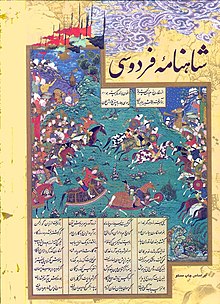Saʿd ibn Abī Waqqās

Saʿd ibn Abī Waqqās ( Arabic سعد بن أبي وقاص, DMG Saʿd ibn Abī Waqqāṣ , * 595 ; † 664 ) was a companion of the Prophet Mohammed and one of the ten who were promised Paradise by Mohammed.
He belonged to the Quraishite clan of the Banu Zuhra from Mecca and was thus the cousin of Āmina bint Wahb , the mother of Mohammed. His mother was Hamna, the great cousin of Abū Sufyan ibn Harb . His kunya was Abu Ishaq. He was an armorer and merchant.
Abu Bakr brought Saʿd to Islam after, according to tradition, he had a dream in which he walked towards a shining moon in the dark. Abu Bakr explained this dream with the appearance of the new prophet. Saʿd was 17 years old at the time and the third person to embrace Islam .
When his mother heard that her son had accepted Islam, she wanted to urge him to turn away from it and return to polytheism by not eating and drinking. In the course of this, sura 31 , verses 14 and 15 was revealed:
“And we commanded people with regard to their parents - their mother carried them with great difficulty (before their birth) (under their hearts), and it was (another) two years before they were weaned -: 'Be me and grateful to your parents! For me it will (after all) end. But if they press you to add something to me (in my divinity) of which you have no knowledge, then do not obey them! And associate with them in a friendly way in this world, but follow the path of those who turn to me (repentant)! Then you will (die and) return to me. And then I will tell you about what you have done (in your earthly life). '"
He fathered 36 children, 18 boys and 18 girls, all especially in the class book of Muhammad ibn Sa'd up. At the time of the farewell pilgrimage , according to Sa Angabed, only one daughter was still alive.
Saʿd was an important fighter and general in the name of Islam. He took part in all major battles of the early days of Islam, such as Badr , Uhud , Trench Battle , Battle of Hunain and Chaibar . He was in command of the Battle of Kadesia , one of the milestones in the expansion of Islam. In Badr and Hunain he was the standard bearer. According to several traditions, he is said to have been the first to shoot an arrow in Islam.
One of his achievements is the founding of the city of Kufa in Iraq, of which he then became governor. The second caliph Umar ibn al-Khattab proposed Saʿd as his successor in the office of caliph. Saʿd then took part in the assembly that Uthman ibn Affan elected caliph. He died in Al-Aqiq, about 10 km from Medina in the year 55 after the Hijra, as the last of the Muhajirun and was buried in the Al-Baqiʿ cemetery in Medina. He left a fortune of 250,000 dirhams .
literature
Ibn Saʿd: Biographies. Eduard Sachau (editor), Brill / Leiden, 1904, vol. 3, part 1, p. 97 ff.
Individual evidence
- ↑ Ibn Kathir: Tafsīr al-Qurʾān al-ʿaẓīm , 2000, edition 1, volume 11, p. 54
| personal data | |
|---|---|
| SURNAME | Saʿd ibn Abī Waqqās |
| BRIEF DESCRIPTION | Companion of the Prophet Mohammed |
| DATE OF BIRTH | 595 |
| DATE OF DEATH | 664 |